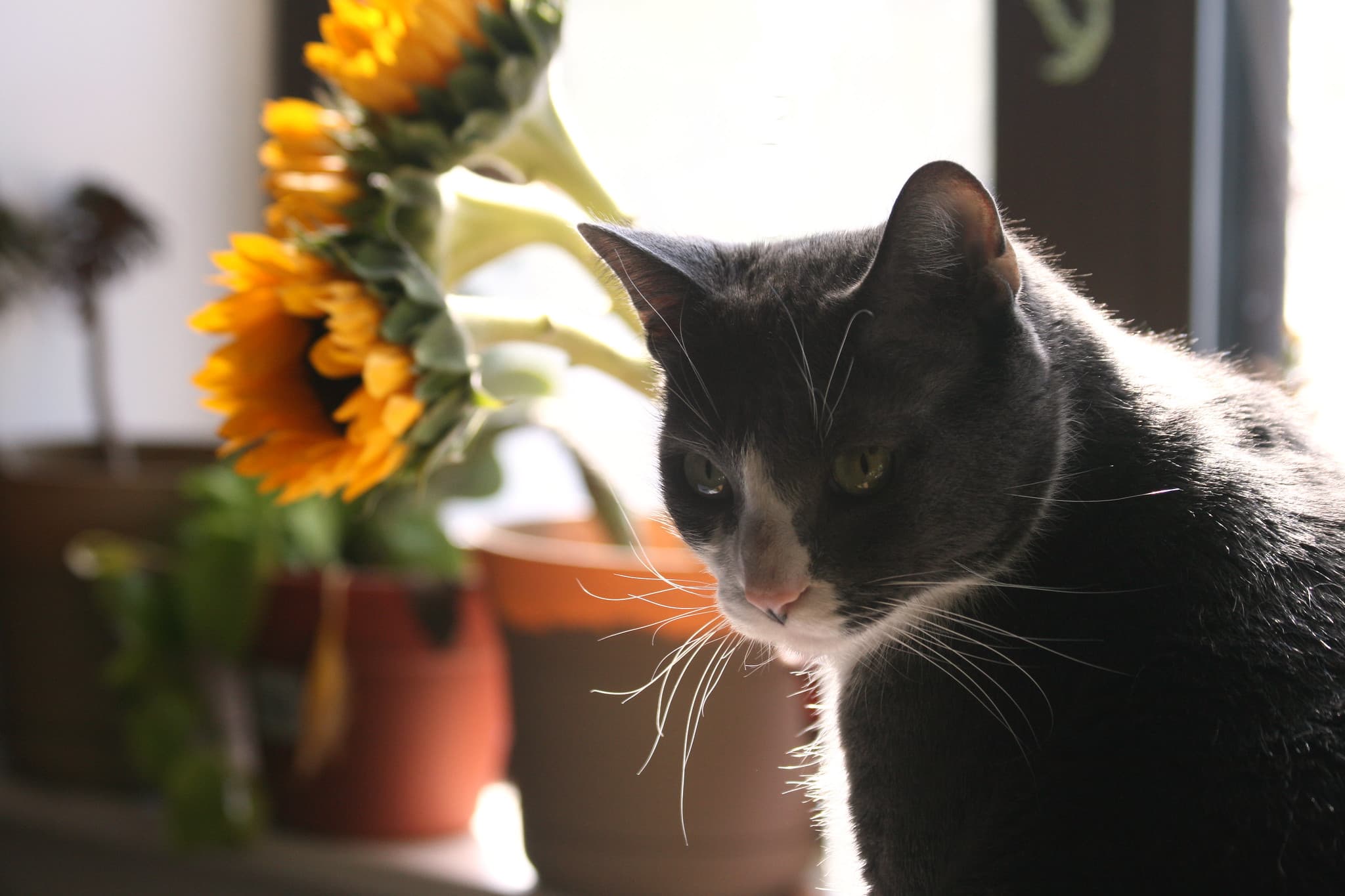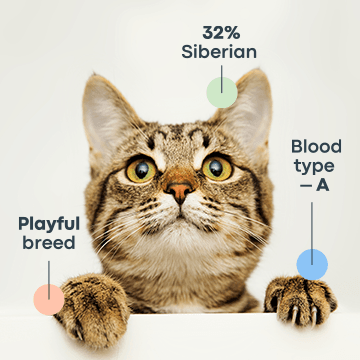It is a cute photo op, but does munching on a sunflower carry any adverse health risks to your cat? Are there any precautions you should take to keep your pet safe?
Are sunflowers dangerous to cats?

The American Society for the Prevention of Cruelty to Animals deems sunflowers non-toxic to cats, so nibbling on the occasional sunflower should not cause any ill effects. If a sunflower and cats are in the same room, everything and everyone should be safe. Cats are predominantly meat eaters but can crave greens occasionally to obtain nutrients missing from their regular diet. This is normally no cause for concern, but if your cat starts to regularly feast on your sunflowers it’s wise to discourage this behavior. Too many greenies can cause mild but unwanted digestive issues for your cat.
You may want to consider training your cat to stay away from your sunflowers with your voice or a clicker combined with a treatas positive reinforcement for good behavior. The sound marks the precise moment your cat performs the desired behavior so your pet has a clear idea of what they need to do to earn that yummy treat.
What about Sunflower Seeds?

Are sunflowers poisonous to cats if we are talking about seeds? The sunflower plant is not poisonous to cats, including the seeds. However, this does not include the sharp shell, just the kernels. A sunflower seed shell can cause internal injuries if ingested by your cat.
Moderation is key. Your cat has a relatively small stomach and obviously should not be eating human-size portions. To guard your kitty’s tummy, sunflower seeds should be offered only as an occasional treat. A few seeds a couple of times a weekis a good rule of thumb, but always check with your veterinarian before introducing new food to your cat’s balanced diet
Can Cats Have Sunflower Oil?

Sunflowers and cats can be semi-friends. Sunflower oil is non-toxic to cats and is even beneficial to the animal given in small amounts. Sunflower oil is an effective skin moisturizer, and also boosts your cat’s energy level and immune system. Use sparingly, as overdoing it can cause your cat mild gastric upset. You can add sunflower oil to your cat’s wet or dry food. A 5 to 1 ratio of omega 6 to omega 3 is the perfect amount for your cat to derive the maximum health benefits.
What Are Some Cat-friendly Plants?

Luckily for cat-loving gardeners, there are many varieties of houseplantsthat thrive indoors and pose no danger to your pet. Here is a small selection of plants considered safe for your feline friend.
Boston fern
A favorite indoor plant that is also cat-safe and low maintenance is the Boston fern. If you need a splash of color in your bathroom, the humidity-loving Boston fern is a great choice. It’s not dangerous for felines, but it is still best to discourage your kitty from ingesting this plant to avoid unnecessary gastric upset.
African violets
Another indoor year-round bloomer that is non-toxic to felines is the African violet. These plants are a colorful and safe choice if your indoor or outdoor garden has a cat in residence.
Roses
Roses are considered safe for your cat. If your cat consumes a rose plant, the worst you can expect is some mild gastric symptoms like vomiting and diarrhea. However, the thorny rose stems can wound an unsuspecting cat that is a little too zealous.
Orchids
Most varieties of orchids are considered safe for cats. But since orchids belong to such a large and diverse family, it is advisable to check if your variety is compatible with your furry family member.
What Flowers Are Toxic to Cats?
There are certain plants that can prove to be dangerous to your kitty. The ASPCA provides a comprehensive list of hazardous flowers and plants so you can choose the best plants to keep your cat safe and healthy. Always research a plant before bringing it into your home. Here are two common plants that are best avoided by cat parents.
Tulips
Tulips are part of the lily family (Liliaceae). They contain chemicals called Tulipalin A and B that are toxic to cats. The flower bulb contains the highest amount of toxins. If your cat consumes a tulip plant vomiting, drooling, and diarrhea may result.
Lilies
According to the Pet Poison Helpline, lilies (Lilium) are among the plants most poisonous to cats. True lilies (Lilium) and daylilies (Hemerocalis) are particularly toxic to your pet. All parts of the lily can cause serious damage to your cat, including kidney failure.
Early symptoms of lily poisoning include mild to excessive drooling, vomiting, and lethargy. If you think your cat has ingested a lily, call your vet as soon as possible and let them know if your pet is experiencing any of these signs of lily toxicity.
Conclusion
Sunflowers are bold and beautiful harbingers of late summer. They are also non-toxic to cats and will not likely cause significant health issues if consumed. But keep in mind sunflowers can cause mild gastrointestinal distress for your pet, so they are best left off your kitty’s menu.
Frequently Asked Questions
Is it OK for cats to eat sunflowers? Is a sunflower toxic to cats?
The American Society for the Prevention of Cruelty to Animals deems sunflowers non-toxic to cats, so nibbling on the occasional sunflower should not cause any ill effects
Why do cats eat sunflowers? Are sunflower leaves poisonous to cats?
Cats are predominantly meat eaters but can crave greens occasionally to obtain nutrients missing from their regular diet. This is normally no cause for concern, but if your cat starts to regularly feast on your sunflowers it’s wise to discourage this behavior. Too many greenies can cause mild but still unwanted digestive issues for your cat.
Are sunflowers toxic to animals?
The sunflower plant is not dangerous for cats to consume, including the seeds. This does not include the sharp shell, just the kernels. A sunflower seed shell can cause internal injuries if ingested by your cat.





